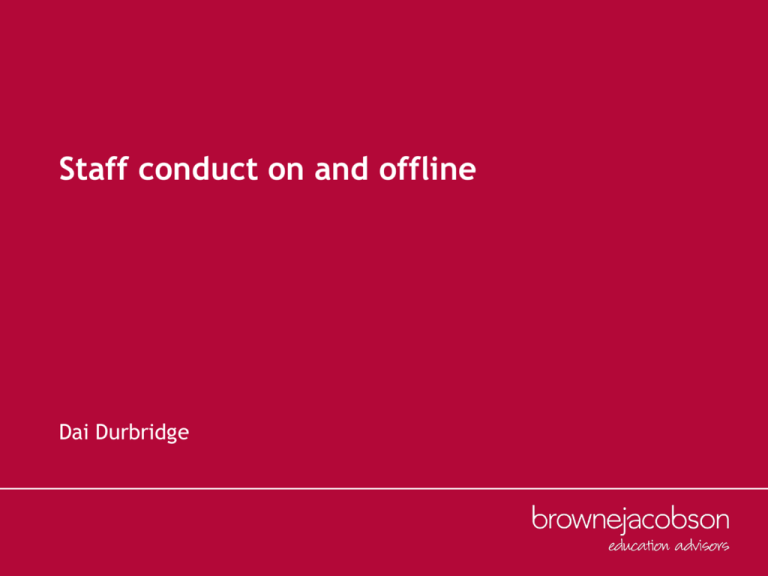
Staff conduct on and offline
Dai Durbridge
This session
Breach of trust offences
Recent examples and common themes
Risk areas
Policies to manage those risk areas
Plenty of time for discussion and questions
What are the risks?
Blurred boundaries
Inappropriate relationships
Reputational damage for your
organisation
What are our concerns?
Mobile phone contact
Text contact
Social media contact
Social media exposure
Does it happen much?
Education examples
• Jeremy Forrest
One female pupil
15
• Salford Stallion
Three female pupils
14+
• Emma Webb
Five male pupils
15-17
• Helen Goddard
One female pupil
15
Does it happen much?
Education examples (cont)
• Madelaine Martin
One male pupil
15
• Christopher Hird
Three female pupils
13-15
• Robert Liddle
One female pupil
15-17
129 teachers convicted between 1991 and 1998
959 allegations of inappropriate relationships in 5 years
Breach of trust offences
S.16-21 Sexual Offences Act 2003
Any pupil under 18 at your school or
college
Four different offences, all very
serious
Breach of trust – quick quiz
Four main offences based on relationships with pupils.
For the offence to apply:
• Do you need to have direct contact with the pupil?
• Do they need to be in your class?
• Is it enough simply for them to be a pupil at your school?
• Does it have to involve a teacher or could it be wider staff?
When does the offence apply?
The offence applies if:
• “A” looks after persons under 18 who are receiving
education at an educational institution and “B” is receiving,
and “A” is not receiving, education at that institution
In other words:
• You are “A” and “B” is any pupil at your school
What are the four offences
• Sexual touching of B by A (s.16)
• Causing or inciting B to engage is a sexual activity (s.17)
• Engaging in sexual activity in front B (s.18)
• For the gratification of A, causing B to watch a sex act (s.19)
What is the penalty?
• Prison
• Sex offenders register
• GTCW sanction
• Barred by the DBS from working with children
Underlying themes
In each of the cases discussed earlier, one or more of the
following were recurring themes:
• Over familiar teacher/pupil relationship
• Social networking contact
• Mobile phone and text contact
In some case, school culture was also an issue
Outside of education
Do the breach of trust offences apply?
• No
• But professional body sanctions, DBS barring, reputational
damage and prison all do
What are the risks with social media and
mobile phone contact and how can we
mitigate them?
Scene setter
• Used education as a case study
• Applies equally to health, social care, youth services and so
on
• When we talk about education, think about your workplace
and practices
What are the risk areas?
• Social networking contact
• Mobile and text contact
• School culture:
• Over familiar teacher/pupil relationships?
• Whistle blowing polices?
• Whistle blowing in practice?
Social networking sites
• Staff profile pictures
• Staff posts
• Teacher pupil contact
• Open privacy settings
• Friending
• Photo sharing
What is your school’s approach?
• Do you have a policy that covers friending pupils?
– What does it say?
• Do you talk to you staff about being sensible with:
– Privacy setting?
– Profile picture?
– Posts?
Can you influence your staff in this respect?
Mobile and text contact
What is your policy for mobile phone contact?
• Sharing personal mobile phone numbers?
• Teachers sharing with pupils and vice versa
• Is it ever appropriate to exchange numbers?
• Is it appropriate to retain numbers in personal phones?
Mobile and text contact
• Is it appropriate to text pupils?
• Is it appropriate to text pupils from personal mobiles?
• Photo sharing?
• Do you have school/pool mobiles?
• Is your policy/approach fit for purpose?
• What should it say?
School culture
• How does your school approach these risks?
• Can they be nipped in the bud?
• Does it always have to lead to criminal investigations or can
it be stopped sooner?
Strong culture required
What is your school’s culture?
Whistle blowing policy and practice
• Do you have a robust policy in place?
• How have you disseminated it and trained your staff?
• Do your staff feel comfortable enough to do it?
• Will they be believed and supported?
What policies and what should they say?
• A policy to manage digital contact with pupils to cover:
•
•
•
•
•
social media
mobile phone and text
email
instant messaging
future proof against new methods
• What do you want yours to say?
Questions?
Five key messages to take away
1. What does your social networking pages say about you?
2. Are you and your staff complying with your policy?
3. Influence colleagues re their social network appearance
4. Lead by example
5. Ensure clear boundaries with children
Dai Durbridge | 0161 300 8037 |
dai.durbridge@brownejacobson.com








